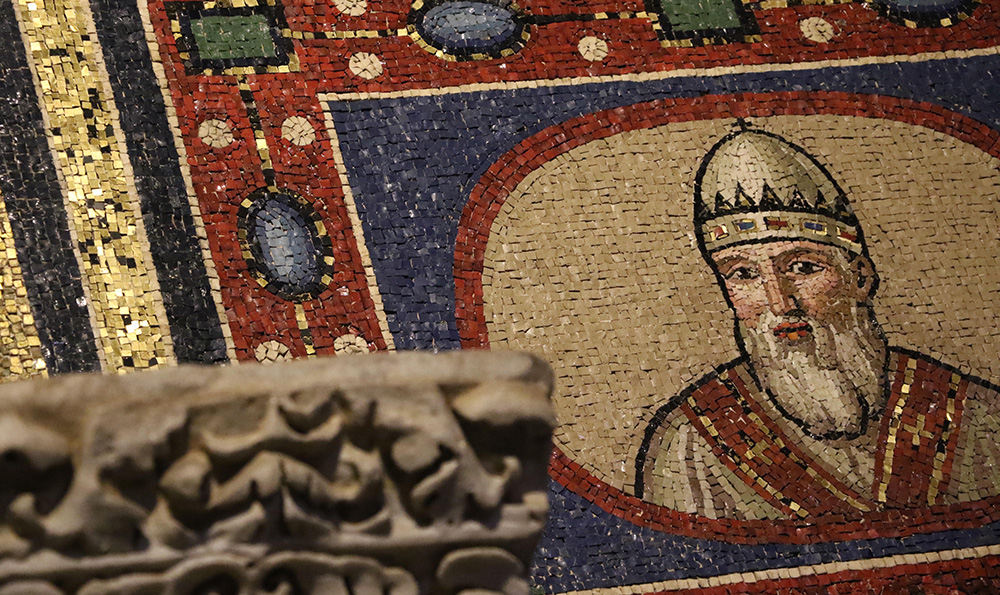The Absurd Reich
Gary Inbinder on the Politics of Demonic Nothingness
Democrats “gotta have faith,” argues former Treasury Secretary Robert Reich, and what’s more, they gotta have an “irrational faith” that we can work together to “create a more just nation and a more just world.”
Writing in Slate magazine’s analysis of our November 2004 election—a forum that tried to figure out why the Democrats lost again—he admits that such a faith is “entirely irrational” because there is little empirical evidence to justify it. It certainly is not the fides caritate formata (faith formed in love) of Scripture. If there is any “love” in the formation of Reich’s faith, it is the “love” of humanity in the abstract that lies at the core of Enlightenment humanism.
He does not advise Democrats to become more religious, because “religion is a personal matter.” He does not want Democrats moving toward Republican positions on “matters of personal morality,” such as opposing homosexual marriage and abortion. Democrats can argue for “fewer abortions” through the wider dissemination of contraceptives to young people, more family planning, and better social services, as long as individual choice is protected.
Reich apparently believes that man lives by bread and circuses alone, that is, by the satisfaction of his material needs and animal desires, and that any spiritual needs may be satisfied by maintaining an “irrational faith” in our ability to use national or transnational organizations to see to it that those material goods are distributed more equitably. As for faith in God, he declared in The American Prospect that “the great conflict of the 21st century will not be between the West and terrorism.” Terrorism he called “a tactic, not a belief.”
The true battle will be between modern civilization and anti-modernists; between those who believe in the primacy of the individual and those who believe that human beings owe their allegiance and identity to a higher authority; between those who give priority to life in this world and those who believe that human life is mere preparation for an existence beyond life; between those who believe in science, reason, and logic and those who believe that truth is revealed through Scripture and religious dogma. Terrorism will disrupt and destroy lives. But terrorism itself is not the greatest danger we face.
We can gather a few things from these passages: First, according to Mr. Reich, it appears that giving “priority to life in this world” does not extend to the lives of the unborn; second, “those who believe in science, reason, and logic” must paradoxically have an “irrational faith” in the human capacity for establishing utopian “social justice”; third, traditional Christians and Jews, who repose their faith in something that transcends the human, are the enemies of “modern civilization,” indistinguishable in their beliefs from Islamo-Fascist terrorists.
Reich’s Mere Humans
While musing on Reich’s irrational rationalism, I recalled the philosopher Eric Voegelin’s remark that Christianity has made clear “that man in his mere humanity, without the fides caritate formata, is demonic nothingness.” The “demonic nothingness” of “mere humanity” has wormed its way into both our politics and the existentialism of pop culture.
It is nowhere better expressed than in the popular song, “Is That All There Is?” In the song, the narrator relates the existential detachment and disillusionment he felt with the loss of possessions and pleasures. He describes the loss of comfort, security, and possessions by fire; disappointment in a popular entertainment billed as “The Greatest Show on Earth”; the loss of first love; and finally, the inevitable loss of life itself—responding to each with the question, “Is that all there is?”.
The narrator seems to agree with Ecclesiastes: “I have seen all the works that are done under the sun; and, behold, all is vanity and vexation of spirit.” Therefore, the question “Is that all there is?” ends with the final response: “If that’s all there is my friends, then let’s keep dancing—Let’s break out the booze and have a ball—If that’s all there is.”
Of course, there is another materialist response to this existential dilemma. That is a modern political response of pseudo-morality in action, first criticized by Edmund Burke in his Reflections on the Revolution in France, and the response advocated by existentialists like Sartre and Heidegger: to “seize the day” by aligning one’s alienated self with the great “progressive” movements of the time. Sartre chose Stalinist Communism, and Heidegger, albeit briefly, Hitler’s National Socialism.
Burke, writing during the French Terror, described the existential horror of twentieth-century Europe. Man, he wrote, “is by his constitution a religious animal . . . atheism is against, not only our reason, but our instincts [and thus] it cannot prevail long.” The anti-religious mania fostered by the French Revolution would leave whole nations in a spiritual void that would inevitably be filled by “some uncouth, pernicious, and degrading superstition.”
When Reich writes of his “irrational faith,” he seems to agree with Burke that “atheism is against, not only our reason, but our instincts.” Nevertheless, Reich has already answered our existential question by presuming that material comforts and animal pleasures are “all there is,” and therefore he thinks the “moral” thing to do is to urge the Democratic party to embrace enough of socialism to provide material goods through re-distribution of wealth and increased social services, while simultaneously preserving enough of capitalism to maintain a sound economic tax base for his welfare state.
Further, he seems to want to preserve the individual’s “right” to “break out the booze and have a ball” within an ever-expanding zone of privacy, unfettered by Judeo-Christian morality and with little concern for the corrosive effects such radical individualism might have on civil society.
Dragged Down Democrats
Be that as it may, in his adherence to an “irrational faith” in the establishment of “social justice” by material and political means alone, Reich risks dragging his party down into Burke’s “void,” because he has closed himself, and his politics, to the higher part of our human nature and consciousness.
He has closed them to the “Divine Ground of Being” that is recognized, in their common sense and common human experience, by the majority of those whose votes the Democrats seek. Further, he appears to be out of touch with basic political reality, because most Americans remain religious and therefore will not easily be persuaded to trade their faith in God for the “irrational faith” of his secular humanism.
In Modern Times: The World from the Twenties to the Nineties, the historian Paul Johnson remarked upon the stubborn persistence of religion, and the human religious instinct, long after the Western intellectual elite had proclaimed God’s death. According to him, “The outstanding event of modern times was the failure of religious belief to disappear.”
Millions in the twentieth century, most particularly in Western Europe, abandoned their religion and filled the void with the “pernicious and degrading superstition(s)”of National Socialism, Communism, humanist utopianism, eugenics and health politics, the ideologies of sexual liberation, racial and environmental politics, and so forth. But for millions more, the overwhelming majority of the human race, religion remains an important part of their lives. “What looked antiquated, even risible, in the 1990s,” Johnson noted, “was not religious belief but the confident prediction of its demise once provided by Feurbach and Marx, Durkheim and Frazer, Lenin, Wells, Shaw, Gide, Sartre and many others.”
To that list of notable secular humanists of the past, I would add Robert Reich and his “irrational faith” in mere humanity’s capacity for “social justice” and “progress.” Promoting the naturalistic worldview that is the foundation of Reich’s “irrational faith” while rejecting the Judeo-Christian foundation of the civil society that made our constitutional democratic republic possible is to practice the Politics of Demonic Nothingness. If the Democrats continue to do so, they may well continue to be losers in politics—and losers in more than politics.
Reich’s article can be found in Slate magazine’s analysis of the 2004 election (www.slate.msn.com/id/2109190). Voegelin’s remark appears in his “What Is Political Reality?”
Gary Inbinder is a California attorney who specializes in health-care law. He holds a B.A. in English Literature from the University of Illinois, Chicago, and a J.D. from the University of La Verne (California). His articles have appeared in Humanitas, Quodlibet, and Praesidium.
subscription options
Order
Print/Online Subscription

Get six issues (one year) of Touchstone PLUS full online access including pdf downloads for only $39.95. That's only $3.34 per month!
Order
Online Only
Subscription

Get a one-year full-access subscription to the Touchstone online archives for only $19.95. That's only $1.66 per month!
bulk subscriptions
Order Touchstone subscriptions in bulk and save $10 per sub! Each subscription includes 6 issues of Touchstone plus full online access to touchstonemag.com—including archives, videos, and pdf downloads of recent issues for only $29.95 each! Great for churches or study groups.
Transactions will be processed on a secure server.
more on politics from the online archives
more from the online archives
calling all readers
Please Donate
"There are magazines worth reading but few worth saving . . . Touchstone is just such a magazine."
—Alice von Hildebrand
"Here we do not concede one square millimeter of territory to falsehood, folly, contemporary sentimentality, or fashion. We speak the truth, and let God be our judge. . . . Touchstone is the one committedly Christian conservative journal."
—Anthony Esolen, Touchstone senior editor












